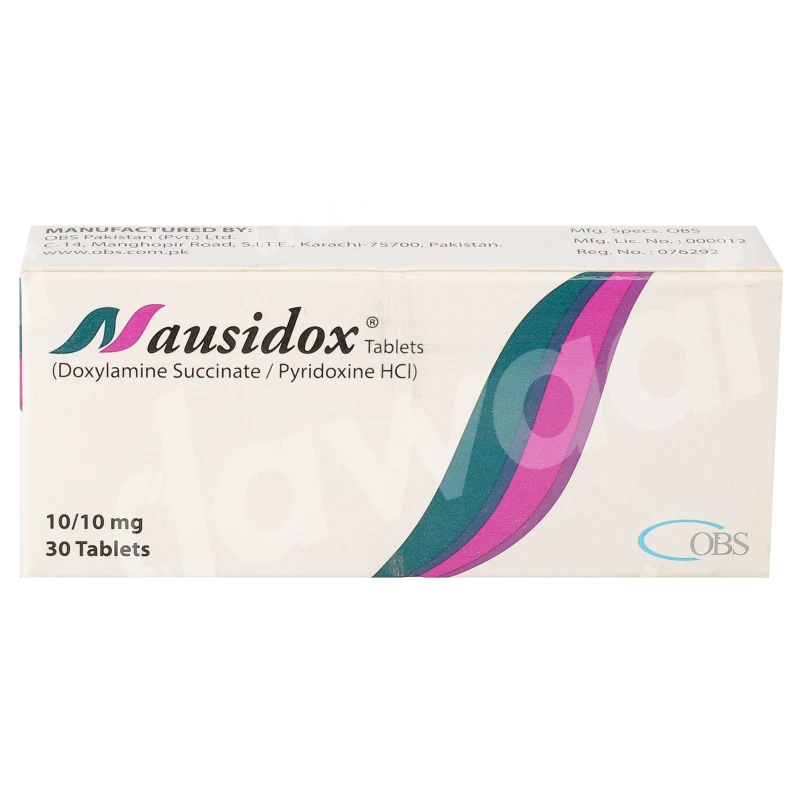Introduction
How To Use
- Take doxylamine by mouth with or without food as directed by your doctor, usually once daily.
- Chew the chewable tablets; do not swallow them. Swallow the other tablets and liquid doxylamine.
- Take this product regularly to get the most benefit from it.
- To help you remember, take it at the same time each day.
- Follow the diet planrecommended by your doctor or dietician.
- Dosage is based on your medical condition and response to treatment.
- Do not increase your dose or take this product more often than directed.
Expert Advice
Doxylamine is a risk to the patients who are allergic to it or of its components. Do not use doxylamine without a doctor’s advice if you have ulcers or any disease that affects your stomach, intestines, or digestive system; any type of cancer; or kidney or liver disease.
Primary Uses
Allergy and cold
Indications
- For the treatment of short-term insomnia it is indicated to give an oral dosage of 25 mg, once daily 30 minutes before bedtime as needed. If insomnia persists continuously for more than 2 weeks, the patient should be evaluated.
- For the treatment of symptoms associated with allergies, it is indicated to give an oral dosage of 10 mg in adults, 5 mg in children of age 6-11 years, and 2.5 mg in children of age 2-5 years, every 4 to 6 hours as needed.
Side Effects
Side effects of doxylamine include:
- Myasthenia
- Confusion
- Palpitations
- Impaired cognition
- Hallucinations
- Blurred vision
- Urinary retention
- Constipation
- Sinus tachycardia
- Agitation
- Insomnia
- Headache
- Fatigue
- Drowsiness
- Dizziness
- Weakness
- Restlessness
- Abdominal pain
- Diarrhea.
Warnings
 Pregnancy
Pregnancy
It is safe to use during pregnancy, however, consult your doctor if you are taking doxylamine for a better analysis.
 Lactation
Lactation
This medication is contraindicated or not recommended in lactating females. Consult your doctor before using this medication.
 Driving
Driving
Its intake has shown drowsiness, therefore avoid driving while taking doxylamine.
 Liver
Liver
Patients with liver disease should consult their doctor before using doxylamine.
 Kidney
Kidney
Patients with kidney disease shouldn’t use doxylamine.
 Alcohol
Alcohol
The use of alcohol should be limited or avoided while using doxylamine.
 Precautions
Precautions
Patients who are allergic to doxylamine or any of its components should consult the doctor before taking it. If taking any vitamins, nutritional supplements, and herbal products are taken then consult the doctor before using doxylamine. If any sort of swelling is experienced, consult your doctor immediately. Taking doxylamine supplements, especially in high doses, might result in kidney and liver impairment.
Contraindications
- Doxylamine is contraindicated for use in patients with doxylamine hypersensitivity.
- Doxylamine should be used with extreme caution in patients with asthma.
- Doxylamine should be used with extreme caution in patients with bladder obstruction.
- Doxylamine should not be used within patients with closed-angle glaucoma.
- Doxylamine injections should be used cautiously in those patients with benzyl alcohol hypersensitivity.
FAQS
What are the uses of this medicine?
This medicine is used for treating insomnia (difficulty in sleeping) and symptoms of common cold such as runny nose, itching, irritated nasal passageway, sneezing, watery eyes, etc. Please note that this medicine is not for causing sleepiness in children.
How to store this medicine?
Please store this medicine at room temperature (18-25 Celsius). Keep medicine away from excessive light, moisture, and children. Please do not flush medicines down the toilet. Please read the leaflet provided with the medicine for further storage guidance.
Will I see instant results?
It may take some time for the medicine to work effectively. Use it regularly and as prescribed by your healthcare provider for the best results.
What precautions should I take?
Following are the precautions for use of this medicine: • Do not use or discontinue this medicine if you are allergic to any of the ingredients of this medicine • May make you dizzy so it is advised not to do any tasks that require alertness (e.g. driving) immediately after taking this medicine • Patients with breathing problems must be cautious
Effect on pregnancy and lactation?
This medicine is safe to use during pregnancy and lactation. Consult your healthcare provider before use.
Why are females advised to use this vitamin throughout their pregnancy?
Vitamin B6 helps combat nausea and vomiting in pregnancy.
What is the right method to use this medicine?
Ensure to take in on an empty stomach and with a glass of water.
What medicines should be avoided while using vitamin B6?
Medicine that results in sedation, like cough and cold syrups should be strictly avoided.
Is it safe for lactating women?
No, it is not, since vitamin B6 has the potential to easily pass through the breast milk and harm the baby.
What happens in case of overdose?
This results in aggravation of side effects.
Indications:
This medicine is used for treating Vitamin B6 deficiency, Isoniazid, penicillamine, hydralazine or cycloserine induced neuropathy (nerve dysfunction due to medicinal use), and idiopathic sideroblastic anemia (deficiency of blood due to unknown cause).
Administration:
This medicine is used orally or intravenously. The injectable form is injected into a vein by a medical professional. However, if you are self-injecting or doing it at home, ensure that you follow the correct procedure and take all relevant precautions. The dose is dependent on the age, condition and its severity. This medicine is not recommended for children.
Storage:
Please store the oral form of this medicine at room temperature (18-25 Celsius). Please keep away from excessive light, moisture, and children. Please read the leaflet provided with the medicine for further storage guidance.
Side Effects:
The patients administered with this medicine may experience sensory neuropathy (sensory nerve dysfunction) when used for extended periods.
Precautions:
The patients using this medicine may experience dependence and withdrawal effects with daily doses greater than 200 milligram or more. This use of this medicine has not been established for premenstrual syndrome.
Effects on Pregnancy and Lactation:
The risk associated with use of this medicine during pregnancy cannot be ruled out; therefore, caution is advised. The effects of this medicine in nursing females are undermines; therefore, caution is advised.
Contraindications:
The patients with allergy to Vitamin B6 should avoid use of this medicine.
Disclaimer
Dawaai’s intention is to make sure that it’s consumers get information that is accurate, reviewed by an expert and error-free. However, the information mentioned here should not be used as a replacement for the advice of a qualified physician. The information given here is for informational purposes only, which may not cover all possible precautions, side effects, contraindications or drug interactions. Consult your doctor and discuss your queries related to any medicine or disease.






Reviews
There are no reviews yet.